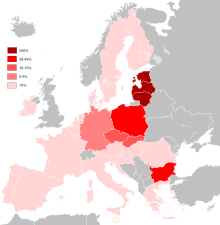Russian language
![]()
Russian is a redirect to this article. For other meanings, see Russian (disambiguation).
The Russian language (Russian, formerly also called Great Russian; in Russian: русский язык, [ˈru.skʲɪj jɪˈzɨk], German transcription: russki jasyk, scientific transliteration according to ISO 9:1968 russkij jazyk, ![]() ) is a language from the Slavic branch of the Indo-European language family. With a total of about 210 million speakers, of which about 150 million are native speakers, it is one of the most widely spoken languages in Europe and is considered one of the world languages. It plays the role of the lingua franca in the post-Soviet space and has the status of an official language in several of its states.
) is a language from the Slavic branch of the Indo-European language family. With a total of about 210 million speakers, of which about 150 million are native speakers, it is one of the most widely spoken languages in Europe and is considered one of the world languages. It plays the role of the lingua franca in the post-Soviet space and has the status of an official language in several of its states.
Closely related to Belarusian, Ukrainian and Russian, the language is written using the Cyrillic alphabet, with certain Russian manifestations. The standard Russian language is based on the Middle Russian dialects of the Moscow area. It is the original language of numerous important works of world literature. The science that deals with the Russian language and the extensive Russian literature is called Russian studies.
Distribution
Russian is spoken (as of 2006) as a native language by about 163.8 million people, of whom about 130 million live in Russia, and another 26.4 million in the CIS states and the Baltic states, i.e. in successor states of the Soviet Union. Another 7.4 million or so live in countries with high immigration from Russia and other successor states of the Soviet Union, especially Germany and other European countries, as well as the USA and Israel.
It is the official language of Russia, Belarus (along with Belarusian), and the official language of Kazakhstan (with Kazakh as the official language) and Kyrgyzstan (with Kyrgyz as the official language). In the Moldovan autonomous region of Gagauzia, it is the regional official language. In Tajikistan, Russian enjoys the official status of "language of interethnic communication". It is also one of the official languages in the separatist regions of Transnistria (along with Ukrainian and Moldovan), South Ossetia (along with Ossetian), Abkhazia (along with Abkhaz), Nagorno-Karabakh (along with Armenian), Donetsk People's Republic, and Lugansk People's Republic. There it is both the mother tongue of part of the population and the language of a large part of public life.
In addition, there are Russian-speaking minorities in all CIS states and in the Baltic states, as well as in some cases considerable numbers of Russian-speaking emigrants in Western industrialised countries. In Finland, Russian is the largest minority language with 49,000 and thus just under 1% speakers. In Germany, where the largest number of native Russian speakers live outside the former Soviet Union, Russian is the second most widely spoken language after German (and ahead of Turkish), with around three million speakers. (See Russian-speaking populations in Germany.) In Israel, the approximately one million Russian-speaking immigrants make up about one-sixth of the population, making it the third largest speaker group after those of Hebrew and Arabic. There are over 700,000 native Russian speakers in the United States, including over 200,000 in New York, and about 160,000 in Canada, but there are many significantly larger language minorities in both countries. Russian is likewise a widespread language for science, art, and technology. Russian is the fourth most common language from which books are translated into other languages, and the seventh most common language into which books are translated. In 2013, Russian was the second most used language on the Internet.
|
|
| The Russian-speaking world |

Knowledge of Russian in the European Union. As a legacy of the Soviet era, knowledge of Russian is still widespread in Eastern and Central Europe, partly due to the Russian-speaking minorities, especially in the Baltic States.
Alphabet
|
| Russian alphabet
|
Russian is written using the Russian alphabet (Russian русский алфавит/russki alfawit or русская азбука/russkaja asbuka), which is similar to the (Old) Cyrillic alphabet (Russian. кириллический алфавит/kirillicheski alfavit or кириллица/kirilliza).
Since the last spelling reform in 1918, the Russian alphabet consists of 33 letters. Of these, 10 letters are used to reproduce vowels, namely: а, е, ё, и, о, у, ы, э, ю and я. The remaining 23 letters are used to reproduce consonants, with the letters ъ and ь serving not to reproduce specific, independent sounds, but as indicators of the hardness or softness of preceding consonants (for more on this, see: Russian Phonetics).
Questions and Answers
Q: What language is Russian?
A: Russian is a Slavic language.
Q: Where is it mainly spoken?
A: It is the main language spoken in Russia and also by many people in other parts of the former Soviet Union, such as in Ukraine, Belarus, Kazakhstan, Uzbekistan, Tajikistan, Kyrgyzstan, Moldova, Latvia, Lithuania, Turkmenistan and Estonia.
Q: Is Russian an Indo-European language?
A: Yes, Russian is an Indo-European language.
Q: Are there other East Slavic languages besides Russian?
A: Yes; the other two East Slavic languages are Ukrainian and Belarusian.
Q: What alphabet does written Russian use?
A: Written Russian mostly uses the Cyrillic alphabet; some people do however learn to write it in Latin letters. The other East Slavic languages and some of the South Slavic languages use the Cyrillic alphabet as well.
Q: In which countries is Russian an official language?
A:Russian is an official language of Russia, Belarus, Kazakhstan, Kyrgyzstan and Uzbekistan.
Q: Is it one of the six official languages of the United Nations?
A:Yes; it is one of the six official languages of the United Nations along with English Spanish French Arabic and Chinese
Search within the encyclopedia
